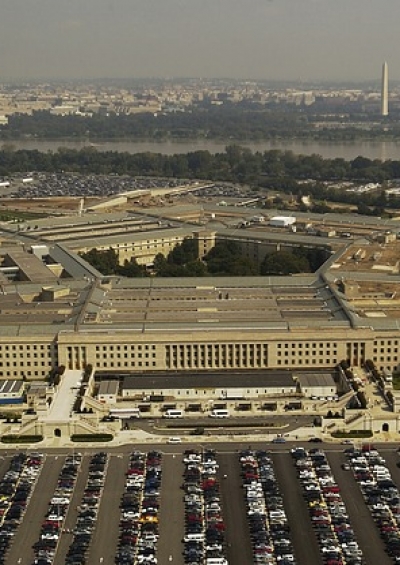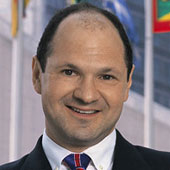US: Government by the Military?
Is the role of the Pentagon and its former brass under Trump similar to the former KGB in post-Soviet Russia?
October 27, 2017

Donald Trump has surrounded himself with generals. He likes their uniforms, medals and stars, as well as the fact that they honor him as Commander-in-Chief.
And it seems Trump likes the (retired) generals’ apparent willingness to politicize themselves, trash their own reputations and generally humiliate themselves to shield him from criticism, in exchange for power and access for their agendas.
The unelected “troika” of generals — Secretary of Defense Jim “Mad Dog” Mattis, National Security Advisor H.R. McMaster and Chief of Staff John Kelly — have taken control of U.S. policy-making.
A few months ago, they convinced Trump to adopt their recommendations on Afghanistan, to continue America’s aimless 16-Year War.
Paying the piper
Lately, however, the tradeoff for securing this came due, as Kelly went through an embarrassing sequence of disputing rumors he would be resigning, politicizing the prior loss of his own son in combat, covering for the President’s absurd lies about recent combat deaths and then spuriously lambasting a Congresswoman.
Meanwhile, Mattis continues to run interference for Trump’s ignorance and McMaster goes against two decades of his own advice to generals, based on a critical analysis of the Vietnam War, to challenge unsupportable and ignorant civilian war decisions.
Still, there has been a kind of inevitability in the way the Pentagon got into the driver seat. The President is inexperienced and an intellectual lightweight. The United States Congress, meanwhile, is led by Republicans whose governing skills have atrophied after eight years of practicing nothing but obstruction under Barack Obama.
The military is now the most cohesive part of the U.S. government, as well as the only one the public respects. According to Gallup, confidence in the military has been consistently above 70%. In contrast, business and the media score in the 20% range. Congress hovers just above single digits.
Even Trump’s liberal critics believe it’s a good thing that the generals are exercising a restraining influence on the rogue Leader of the Free World.
Little wonder then that the White House Press Secretary, Sarah Huckabee Sanders, felt confident that she could deflect any criticisms of Chief-of-Staff Kelly’s behavior by insisting that four-star generals are indisputably above politics.
Good morning, military junta?
Normally, civilian chaos and growing political role of the armed services is the stuff of which Third World military coups are made. But don’t worry about an American junta.
There is a more relevant — and frightening — model: What is evolving in the United States reminds me of a subtle, insidious, quasi-constitutional power grab that took place in Russia back in 1999.
Back then, Boris Yeltsin appointed KGB colonel Vladimir Putin as his successor. Putin got duly elected and gradually placed his KGB buddies in positions of power throughout the government, while also stomping out dissent and hollowing out the nascent Russian democracy.
Now, Russia continues to hold elections, but the country is fully in the grip of former secret policemen who will remain in power long after Putin is gone.
Pentagon and Lubyanka – separated at birth?
There are plenty of similarities between the old Soviet KGB and the Pentagon. The Russian secret police was a fraternity.
Putin once admitted that there is no such thing as a former KGB officer. Once you’re KGB, you’re always KGB.
The U.S. military used to be a citizens’ army, stemming from the Founding Fathers’ ideal of the citizen soldier with a gun behind every kitchen door, ready to defend the country.
But after Vietnam, politicians found it expedient to abolish the draft and to build an all-volunteer, professional force. During the two ongoing wars in Afghanistan and Iraq, this force has forged close internal ties — a true frontline brotherhood that is resentful of those who don’t belong to it.
While the chasm with civilian society is widening, military families are also becoming a special caste in the United States. Since women are now also serving, active-duty personnel have been intermarrying, with the next generation choosing a military career as well.
Falling short
For all the fear that ordinary Soviets felt for their KGB, and respect that Americans have for their men and women in uniform, both the KGB and the U.S. armed services have done a lousy job.
True, the KGB was good at spying at home and abroad, ferreting out and arresting dissidents and occasionally assassinating political opponents.
But the KGB managed to completely miss the fall of communism and the disintegration of the Soviet Union, which it had been created to safeguard. (It quickly found a new footing in Russia).
Similarly, the Pentagon won every battle it has been in since the Korean war nearly 70 years ago, but lost every war.
Advice that its top brass proffered to every president from Lyndon Johnson to Barack Obama has led to tactical victories, but never brought Washington closer to extricating itself from open-ended military conflicts. Certainly, victories have been elusive.
When the Soviet Union collapsed, and the Russian state became weakened, the KGB was the only organization strong enough to seize power. The same process is underway in the United States under the Trump Administration.
We are seeing, for example, how the military is starting to ignore Trump and his “total ban” on transgender personnel, and even to contradict him directly, as in a statement by the Joint Chiefs of Staff condemning racism.
Power corrupts
The KGB seemed to be a highly ideologically motivated, patriotic force dedicated to the advancement of communism and the Soviet Union. Once its members came to power in post-Soviet Russia, however, Putin’s secret service generals proved to be interested in personal gain and in power to safeguard their ill-gotten wealth.
Russia has become a kleptocracy with no future; the kleptocrats know that and keep their assets and their families outside their supposedly beloved country.
There is no reason to think that American generals, if they were to secure power in Washington, will act differently, despite their apparent commitment to American democracy, the Constitution and patriotism.
The present “troika” around Trump — Secretary of Defense Jim “Mad Dog” Mattis, National Security Advisor H.R. McMaster and Chief of Staff John Kelly — are universally acclaimed as top-notch generals and the best and most honorable men America’s warrior culture has produced.
They are happy to serve in an administration that divides the nation and whose members, starting with their Commander-in-Chief himself, stuff their own pockets.
General Mike Flynn was also considered to be a model soldier. But when push came to shove, he has been revealed as greedy, corrupt and, quite possibly, guilty of betraying the country.
Takeaways
Donald Trump has surrounded himself with generals. He likes their uniforms, medals and stars.
The military is now the most cohesive part of the US government, as well as the only one the public respects.
There are plenty of similarities between the old Soviet KGB and the Pentagon.
The chasm with civilian society is widening and military families are becoming a special caste in the US.
The Pentagon won every battle it has been in since the Korean war nearly 70 years ago, but lost every war.
